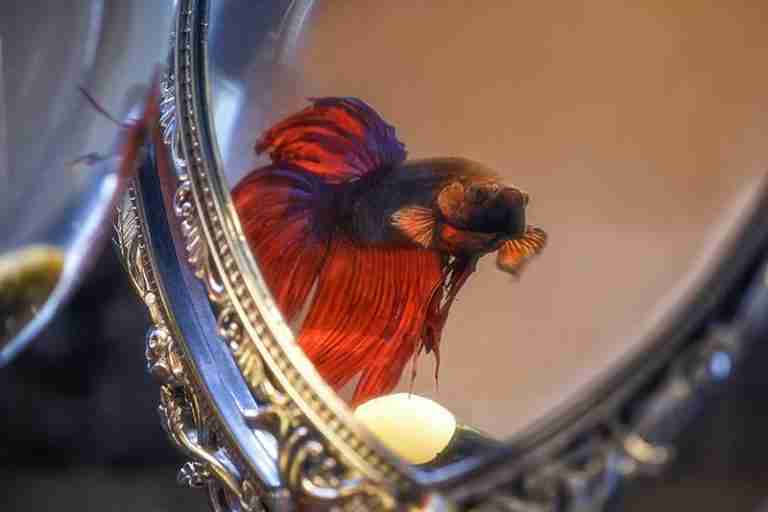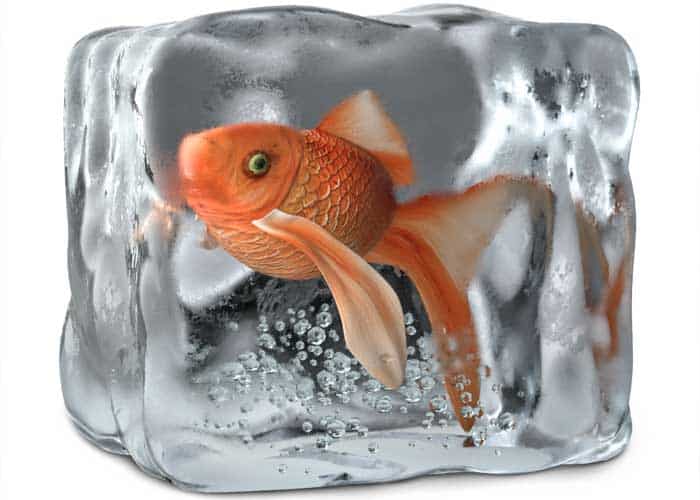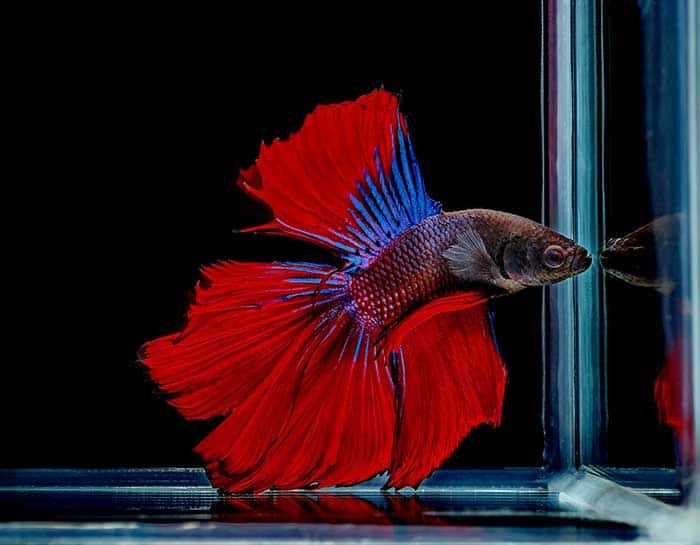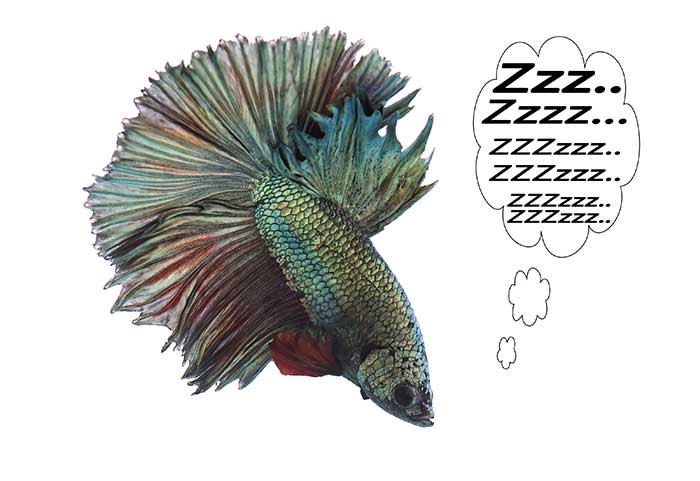Fish Rubbing On Rocks – 6 Top Reasons Why?
If you notice that you have fish rubbing on rocks, gravel, or plants in your aquarium, you may be concerned about whether this is normal behavior or whether they are sick.
Fish often rub on rocks to clean themselves or scratch an itch. It is often referred to as flashing and is a very natural behavior, so don’t be alarmed. If you notice your fish rubbing on rocks more frequently, your fish may have parasites or is stressed because of high ammonia levels in your tank.
If you catch your fish flashing just now and again or more regularly, I have listed 6 of the top reasons why fish like to rub themselves against rocks, which will hopefully help you decide why your fish may display this behavior.
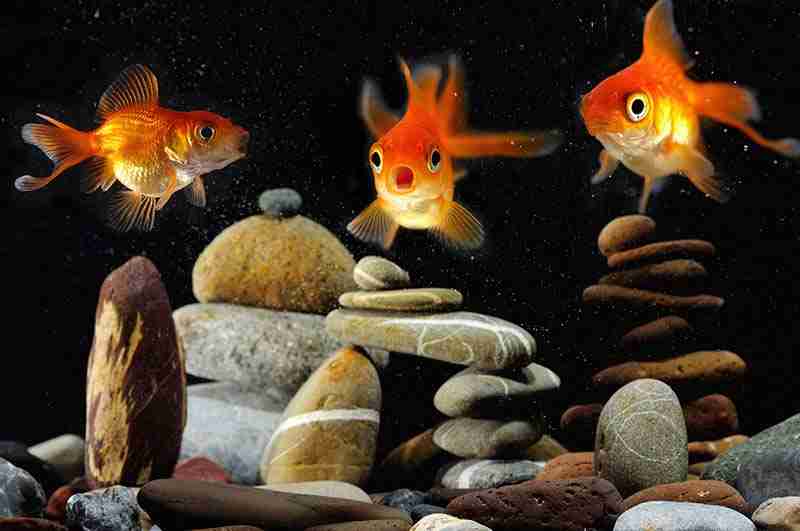
1. Natural Behavior
Most fish flick against rocks or gravel at some time or another. Believe it or not, fish that rub against rocks may be doing so because it is just part of who they are and is completely natural. They may be showing dominance or flirting with each other, getting ready to mate.
Mating rituals and displays of dominance over territory throughout the animal kingdom can be quite bizarre. Fish are no different and have limited ways to show what they think or feel, so they often display weird or unusual behaviors for the most natural reasons.
An example of this behavior would be African cichlids which can display a wide range of mating behavior. Some African cichlids will spawn on rocks and spend time cleaning the rock beforehand by rubbing against it.
It is always worth researching the particular fish species you are concerned about to better understand their natural behavior patterns.
Another natural reason that fish bounce off the bottom of the tank is to uncover food hidden beneath the gravel or sand. As the fish bounce off the bottom, a plume of food particles usually swirls around for your fish to devour.
2. Your Fish May Be Bored
Boredom is another reason why fish display odd behaviors, such as rubbing on rocks or the gravel on the bottom of the tank.

Fish can get bored for many reasons, such as:
- Living in an undersized tank.
- Having little or no company.
- Living in a tank with no ornaments, rocks, or plants.
An undersized tank gives a fish very little or no exercise leading to pent-up frustration and even obesity. Living in such a confined space is so far away from how they would live in the wild that the fish may display its frustrations by rubbing against rocks or gravel on the aquarium base.
If a fish has little or no company, it would be like living in solitary confinement. Many fish species are quite social in the wild, and living a solitary life, I’m sure, would drive it to the edge of insanity or beyond.
Boredom and loneliness cannot be good for a fish’s happiness. Many animals, including fish, have had unusual behaviors noted when kept in captivity that wouldn’t be usual in the wild.
An aquarium with little or no rocks, ornaments, or plants would also be very different from how fish would live in the wild and could lead to boredom. Fish especially like to dart in and out of tubes or arches, often playing with other tank mates.
Fish also like to hide away in dark corners or within the undergrowth as it brings them comfort. Fish in the wild would not be consistently exposed and on show.
All of the reasons listed above can contribute to boredom and, more importantly, how they would live in the wild.
I regularly discuss in my posts how as aquarists, we should be providing the best environment for our fish to live in. By making our aquariums mimic their natural habitats as closely as possible, we can observe the most natural behaviors of our fish at their happiest.
Adding some cheap plants creates something much more natural and helps oxygenate your tank. Adding a cheap piece of PVC tubing can give your fish somewhere to hide or play.
Just taking a few extra steps can curb a fish’s frustrations or boredom quite easily, and you may notice they will stop certain behaviors like rubbing along rocks.
3. Your Fish Has Parasites
Parasites are common, and affected fish may rub themselves on rocks and are of little more concern. Parasites can cause itching, and the only way a fish can detach the parasite is to rub itself along a rough surface.
How Can You Tell If Your Fish Has Parasites?
Fish can suffer from internal and external parasites, often resulting in different symptoms.
If you look very carefully, you may notice parasites hanging from the body of your fish, or you may notice missing scales, ulceration to the skin, or white spots.
If your fish are rubbing against rocks or rough surfaces quite regularly, which is a new behavior, it can also be a sign of parasites.
Parasites are often difficult to spot for beginners, but you will become more accustomed to certain common diseases and how to identify them over your years as an aquarist.
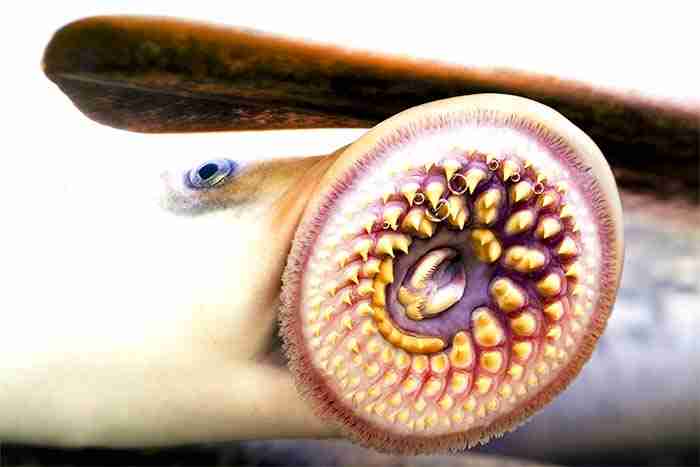
Examples Of Fish Parasites
A discussion on parasitic infections in fish will take a whole post, but I will list a few of the most common parasites you may encounter which will cause itching and discomfort to a fish’s skin.
- Ichthyophthirius multifiliis (commonly known as “Ich” or White spot disease) is probably the most common fish parasite and is easily identifiable by the white spots covering your fish’s body.
- Chilodonella (Wikipedia)
- Trichodina (Science Direct)
- Mongenean trematodes (More commonly referred to as “Flukes“, usually “Gill Flukes” or “Skin Flukes”)
- Anchor worms (University of Florida)
- Argulus japonicus (More Commonly referred to as “Fish Lice“)
- Piscinoodinium
- Hexamita
- Ichthyobodo (or “Costia“)
- Leeches
- Nematodes
The list above is not exhaustive, as many more known parasites can infect both Marine and Freshwater fish.
It is more important to understand that parasitic infections in fish may cause the rubbing behavior on rocks and other surfaces in a fish’s attempt to remove the parasite.
Parasites can get into your tank through newly introduced fish that are already carrying the parasite. Some people like to start new fish off in a quarantine tank for a few days before introducing them to the main tank.
Parasites will also attach to live plants, so adding new plants to an aquarium can inadvertently cause a parasitic outbreak. Live plants should always be cleaned and quarantined for 2 weeks before adding to your established tank.
How To Identify Parasites In Fish
Most parasites have easy-to-identify signs to help you find the correct treatment, such as the white spots from Ich, but gill flukes (Dactylogyrus), and skin flukes (Gyrodactylus) are microscopic and will often cause secondary infections before you will notice anything is wrong.
If you are unsure if a parasitic infection is causing the problem, you should contact a fish vet for advice.
If fish are becoming unwell for reasons such as poor water quality in your aquarium, parasites can quickly spread through the entire population leaving behind much devastation.
If you are worried about a parasite passing to other fish, you can remove the affected fish and place them in a quarantine tank, also known as a hospital tank, where fish can receive treatment for the parasite.
Treating Parasites In Fish
There are many treatments available from local fish stores, such as a salt treatment that would be recommended for many parasites and will often cure Ich. While aquarium salt can be purchased at most pet shops, rock salt or kosher salt is also suitable, but you must follow instructions closely when adding any foreign chemical to your tank.
Salt treatments are also good for Gill Flukes and Skin Flukes. Malachite Green is a safe treatment for many parasites and fungal infections if the salt treatment fails.
Formalin is another effective treatment for fish parasites, but it is not as popular because the active ingredient is formaldehyde which, although highly effective and safe for fish in very low doses, is known to cause cancer. Fromaline should only be used by trained professionals and in severe circumstances.
Find The Best Price On Amazon or Chewy For API Aquarium Salt
Find The Best Price On Amazon Or Chewy For Kordon Malachite Green
Another way to cure many parasites is to increase the water temperature in your tank. You should increase the temperature to at least 82°F to have any benefit, and if your fish can tolerate the increase, a temperature of 86°F is often cure Ich completely.
4. Does Your Fish Have A Fungal Disease
Fungal diseases are often found on dead fish, although they can be found on fish already in poor health with lowered immunity.
Many people have suffered from a fungal infection in their lifetimes, such as Thrush or Athletes’ foot, and can testify to how itchy the skin can become.
If your fish is suffering from a fungal infection, it may have very itchy and uncomfortable skin. As a result, your fish will want some much-needed relief by itching itself against any hard or rough surface in the aquarium.
Fungal infections can often look furry and cause the skin to become soft and inflamed.
You will need to identify why your fish is unwell to stop the infection from returning.
5. Your fish is Stressed
If you have completed a large water change in your fish tank and the newly added water has caused a drastic change to the overall temperature within the tank, it can start a stress response in your fish.
Similarly, if the chemical makeup of newly added water is much different, it can also cause a stress response.
When we talk about stress in fish, we are not talking about money worries or relationship worries. Fish become physically stressed when major changes occur in their environment, such as a drastic change in tank water quality which leads to ammonia poisoning from high ammonia levels, difficulty breathing, or the tank being just too hot.
Water quality problems are a major cause of stress in fish. Ammonia poisoning is often caused by a rise in ph levels which can upset the nitrogen cycle, leading to gill damage and, eventually, difficulty in breathing.

Fish can also become stressed if other fish are bullying them. Bullying often occurs between certain species. It is important to check how compatible your fish is with other species in the tank.
The best fix for stress is figuring out the cause by monitoring other fish in the tank and testing the tank water parameters and quality. Quick water changes are often an easy fix for most problems that may occur.
Increased ammonia levels can be fixed quite easily, and keeping your tank well-oxygenated and clean will keep ammonia levels down. Water test kits are readily available from fish stores and quickly identify any water quality problems.
Find The Best Price On Amazon Or Chewy For Water Test Strips
Invest in a good filtration system and change the filter media regularly (at least once a month). Keep water parameters within suggested ranges, perform regular water changes, and add a water conditioner at regular intervals. By following these steps, you will know that your fish cannot be stressed for natural reasons.
6. Your Fish Is Simply Just Itchy
Fish don’t have hands or fingers to scratch, so it makes perfect sense that fish rub themselves against rocks, sand, or other rough areas in their tank. I’ve often found a nice rough wall or tree so that I can scratch my back against it (Ooooh!! Instant relief….).
Fish scratching themselves will enjoy this feeling of relief as well, and it is a very natural way to relieve themselves of an itch.
It is wise to make sure the rocks in your tank are not too sharp, as fish flashing against sharp rocks could cause injury. African cichlids are known to be quite aggressive, and when these fish bounce off rocks, any sharp edges could cause damage to their skin and scales.



